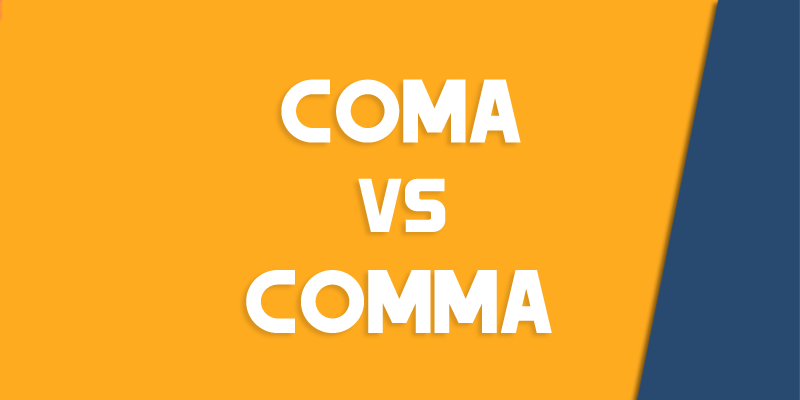Coma vs. Comma – What’s the Gist?
Besides the similarity in spelling and both being nouns, these two words have very little in common.
- Coma is a noun, meaning a state of unconsciousness.
- Comma is a noun, meaning a punctuation mark.
It could be said that both of these words do reflect a pause (one in life and one in grammar); however, they are not interchangeable.

How to Use Coma in a Sentence
Coma definition: Functioning as a noun, coma means to be in a state of profound unconsciousness that is caused by disease, injury, or poison. Additionally, it has a lighter connotation, meaning a state of mental or physical sluggishness.
For example:
- After the car accident, the woman was in a coma for several weeks. (Noun)
- As the disease advanced, it slowly took over his vitality and caused him to slip gradually into a coma. (Noun)
- The family felt the food coma commence after the sumptuous potluck dinner has been consumed. (Noun)
Etymologically, there are a couple fascinating tidbits about the word coma. First, one of the secondary definitions mean the head of a comet, having a cloud of gas and dust, which contains a nucleus. Who knew?
Furthermore, the word coma comes from the Latin and means a deep sleep.
How to Use Comma in a Sentence
Comma definition: Comma is a grammatical mark that is used for separation within a sentence. It also conveys the idea of a pause or an interval.
For example:
- Because she encouraged the students to use fewer commas and more periods, the students wrote fewer run-on errors. (Noun)
- The copyeditor fixed the comma splice in the sentence by replacing the comma with a semicolon. (Noun)
- While waiting for his wife to return from deployment, the man felt like his life was one big comma. (Noun)
The word comma reflects a misused and misunderstood punctuation mark.
Outside Examples of Coma vs. Comma
- Lisa Dallow woke from her two-month coma with some memories of the chaos that followed a volcano’s eruption: the screams, the “boulders” that hit her, the helicopter that finally lifted her away. –The Washington Post
- Bradley Crehan had been hit by a car in Santa Monica and part of his skull was removed to relieve pressure on his brain. He was placed in a medically induced coma, and when he woke 19 days later, he showed few signs of being able to communicate or respond to commands. –The LA Times
- Norris admitted to a frisson of delight when she spots such errors. Pointing to another example, she stressed that “to put a comma between a subject and verb is a cardinal sin.”-The Wall Street Journal
- The skyrocketing stock once again brought Amazon’s market cap past the $1 trillion mark, where it rejoined Alphabet, Apple and Microsoft in the four-comma club — and added about $15 billion to Bezos’s net worth. –New York Post
Phrases That Use Coma and Comma
There are some phrases that use the word coma or comma, including:
Diabetic coma: Someone who loses consciousness because her blood sugar levels are uncontrolled.
- The patience’s dangerously high blood sugar levels caused a diabetic coma.
Food coma: Overeating that causes a feeling of lethargy and torpor.
- After eating Thanksgiving Dinner, the family sits around in a food coma.
Comma splice: A punctuation error when two independent clauses are separated by a comma.
- The student asked the teacher, “What’s a comma splice?”
How to Remember These Words
A simple mnemonic device to keep these words clear in your mind is to remember the adjective for coma is comatose. Both words have one letter m.
Since comma is a grammatical term, note that both of these words have the double m.
For example:
- The comatose patient lay in a coma.
- One thing you learn in grammar class is about commas.
Quiz: Coma or Comma
- Because of the severe illness, the hospital staff placed the patient in a medically induced _______.
- The mother eventually came out of the _______ to the immense joy of the family.
- You need a _______ after that introductory clause.
- Nonrestrictive appositives need _______ on either side of it.
Article Summary
Is coma or comma correct? As mentioned, these words are not interchangeable. If you need a noun that indicates some kind of state of unconsciousness, use the word coma. If you want a grammatical term referring to punctuation, pick comma.
Admittedly, reading about commas might put you into a temporary coma.
- Coma is a noun.
- Comma is also a noun.
Quiz Answers
- Coma.
- Coma.
- Comma.
- Commas.
